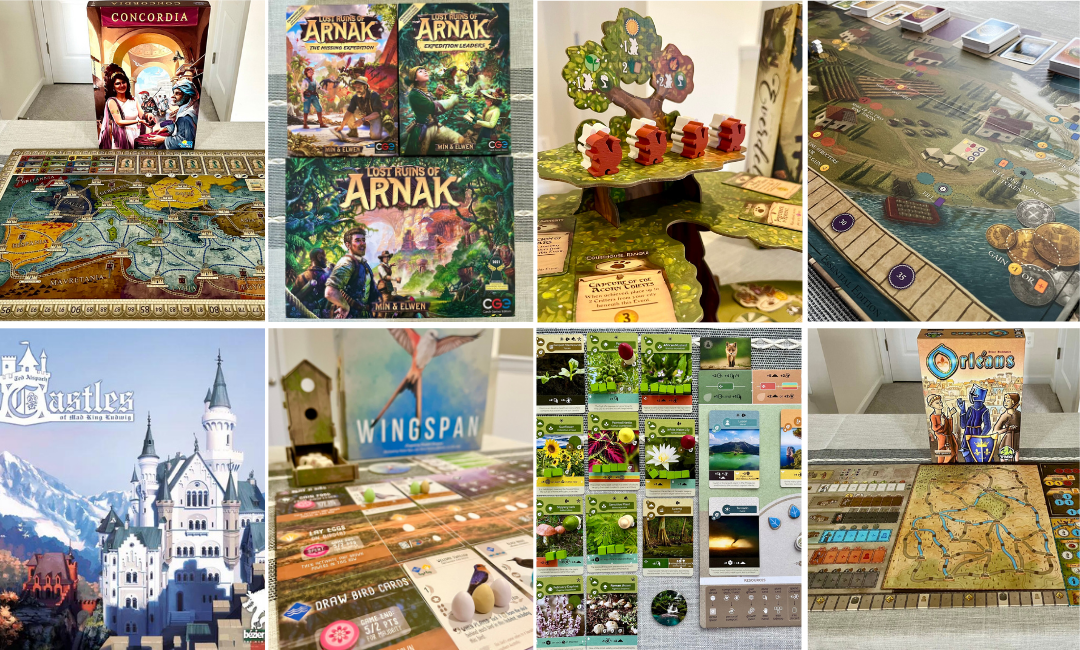Welcome to this week’s gaming post! This is the follow up to a post I did a few weeks ago where I discussed a few of my favorite games to introduce to new board gamers. This time, I’ll be discussing games that are a step up from Ticket to Ride or The Crew, but still not in the heavy games territory. It was very hard to narrow this list down to a handful of games, as a many of my favorite games fall in this light to medium-weight range, so I’ve included eight games instead of the usual five. So without further ado, let’s jump into the games.
8. Everdell
- Designer: James A. Wilson
- Complexity: Medium
- Time: 40-80 Minutes
- Players: 1-4
- Main Mechanisms: Tableau Building, Worker Placement
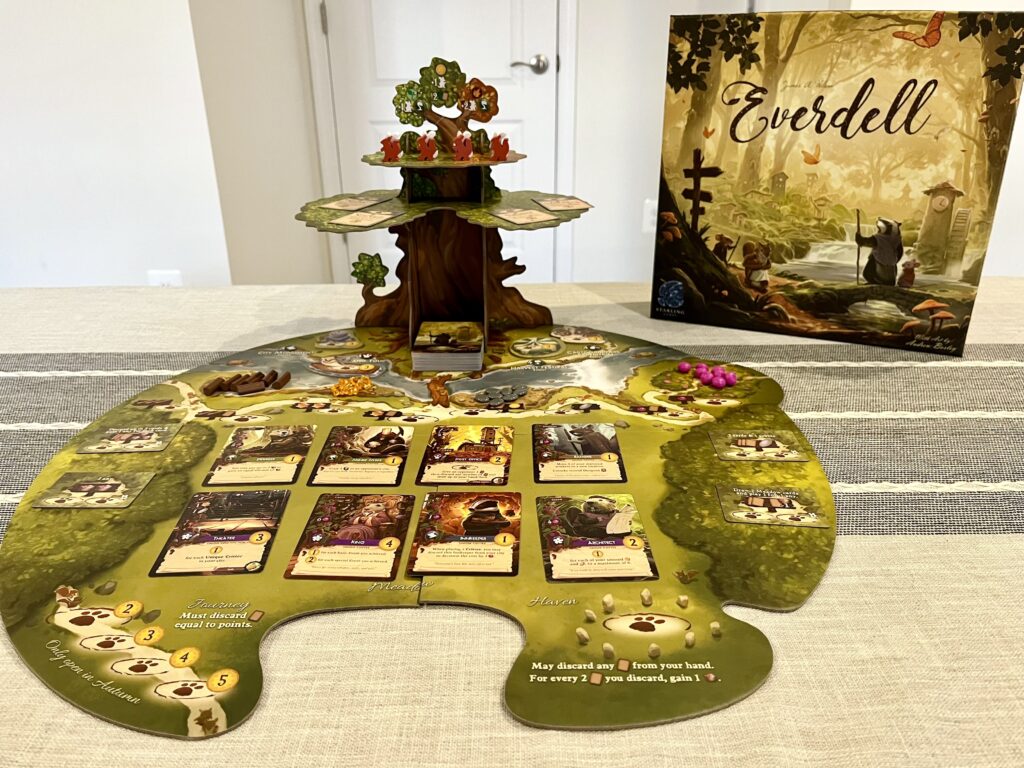
First up is Everdell, a tableau building, worker placement game with wonderful artwork and cute critters. In Everdell, players are progressing through the four seasons at different speeds, collecting resources and using them to play construction and critter cards into their tableau of up to 15 cards. There’s also a 7 Wonders style mechanism where after building a construction into your tableau, you can play the associated critter for free. The approachable theme makes Everdell easy to jump into, and while I usually prefer to play with just the base game, there are plenty of expansions, as well as another standalone game.
7. Wingspan
- Designer: Elizabeth Hargrave
- Complexity: Light-Medium
- Time: 40-70 Minutes
- Players: 1-5
- Main Mechanisms: Engine Building, Tableau Building
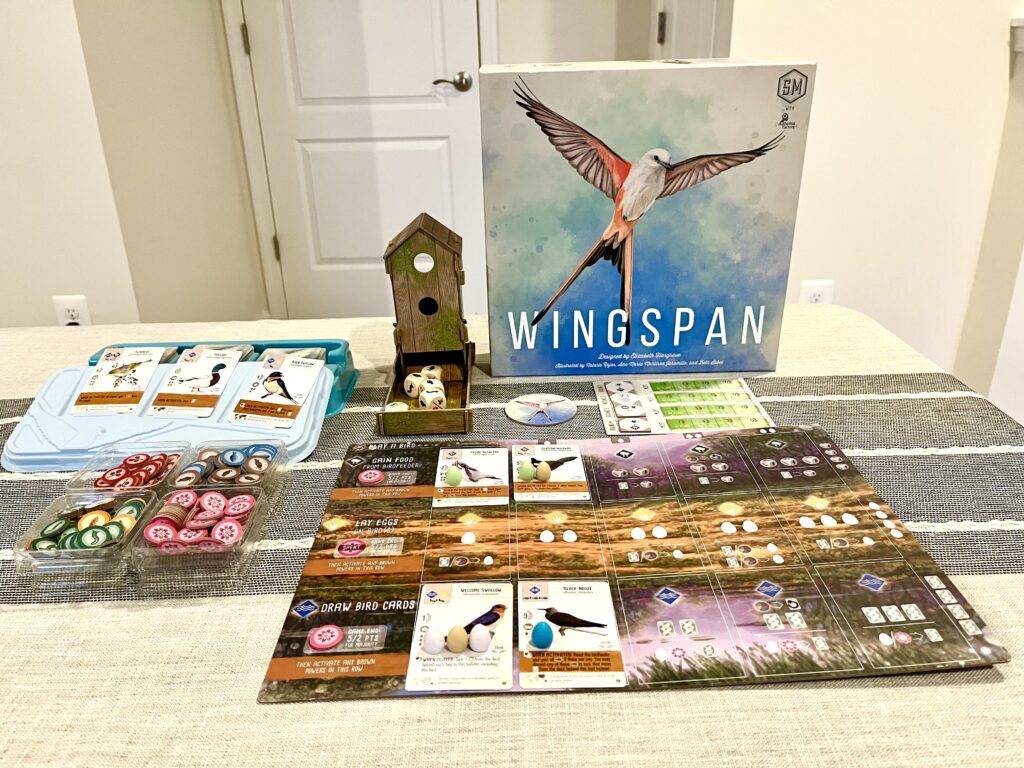
Next up is Wingspan, another tableau, engine builder all about birds. In Wingspan, players are collecting food to play birds into their tableau, laying eggs, and triggering abilities. This one took me some time to grow fond of, but particularly with the excellent Oceania expansion, Wingspan has become a go-to when I’m looking for a light to medium weight game. While I haven’t tried it yet, there’s also a reimplementation with dragons if birds aren’t your cup your tea.
6. Concordia
- Designer: Mac Gerdts
- Complexity: Medium
- Time: 100 Minutes
- Players: 2-5
- Main Mechanisms: Hand Management, Action Retrieval
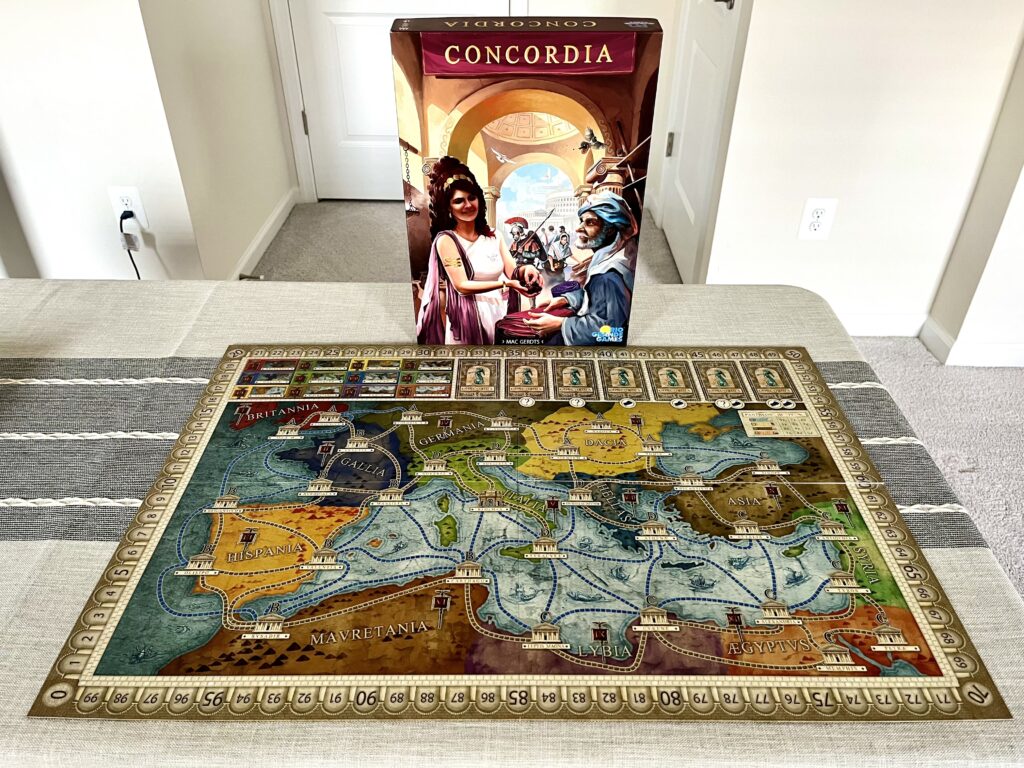
Concordia is a dry euro, all about building cities and trading in the Mediterranean Sea. However, while lacking in theme, the game makes up for it in spades with its mechanics. My favorite part of the game is the deck building and hand management. Every round, players will play one of their cards in their hand, which determines which action the player will take. However, the player can’t play that same card again until they spend a turn to take back all of their played cards to their hand. The cards in a player’s deck at the end also determine how that player will score victory points. There’s also a fair amount of player interaction with determining where to place your cities and when to trigger resource production in the different regions. The game also has a fair number of expansion maps if you grow tired of the two in the base game.
5. Earth
- Designer: Maxime Tardif
- Complexity: Medium
- Time: 45-90 Minutes
- Players: 1-5
- Main Mechanisms: Tableau Building
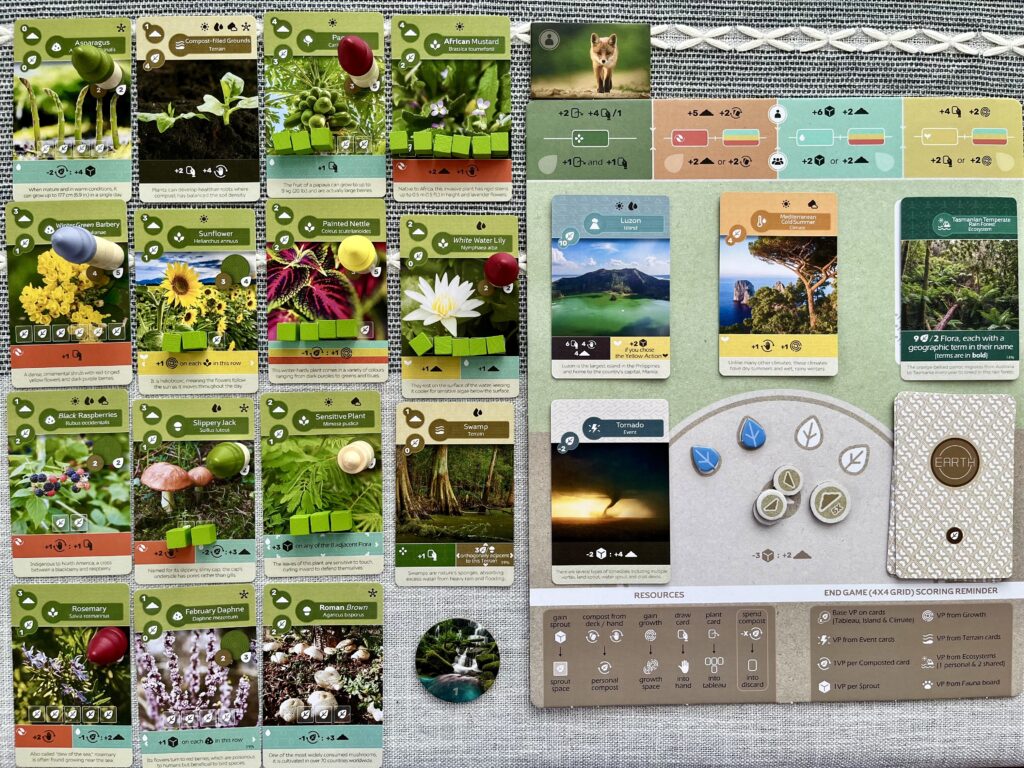
The newest game on this list, last year’s very popular Earth, is another nature-themed tableau, engine builder. The rules in the game are relatively simple, the active player chooses one of four actions, and then all players will simultaneously trigger that same action with the active player getting a slightly better version of it. However, there’s plenty of decision making here as you have to juggle end-game scoring cards, shared objectives, and the abilities on the cards themselves. While still relatively new to me, this one has already seen plenty of plays and has become an easy favorite of mine. I recommend checking out this post if you want to read my detailed thoughts on the game.
4. Viticulture
- Designers: Jamey Stegmaier, Alan Stone
- Complexity: Medium
- Time: 45-90 Minutes
- Players: 1-6
- Main Mechanisms: Worker Placement
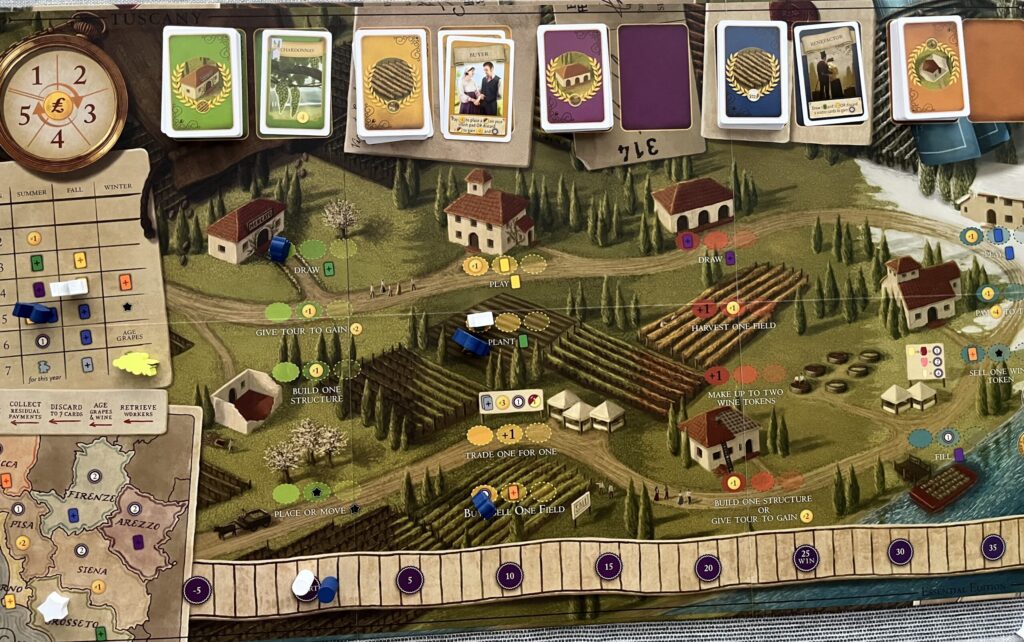
Next up is Viticulture, a worker placement game about running a winery in Tuscany. With the essential Tuscany expansion, rounds take place over four seasons with players taking turns placing workers on action spaces. What I love so much about the game are how the cards make each play feel different. I recommend you check out this post if you want to read my detailed thoughts on the game, but Viticulture is a favorite of mine when I’m looking for a mid-weight true worker placement game.
3. Orléans
- Designer: Reiner Stockhausen
- Complexity: Medium
- Time: 90 Minutes
- Players: 2-5
- Main Mechanisms: Bag Building
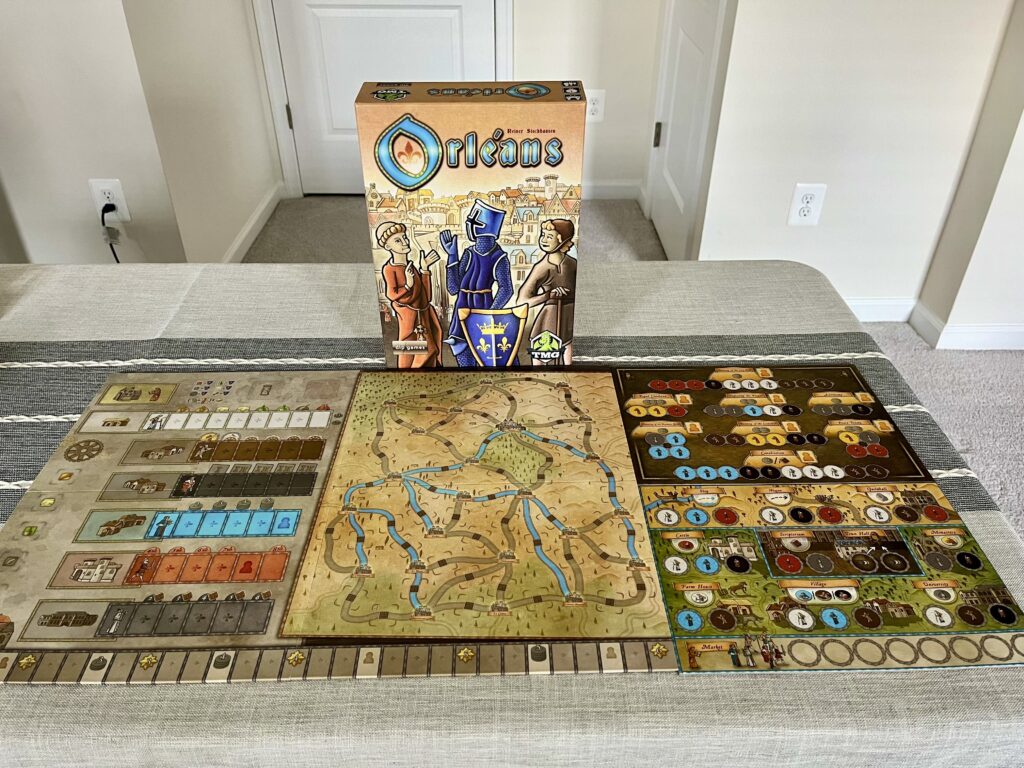
My favorite bag builder, Orléans, is a medieval-themed game set in the French city of Orléans. The bag building creates tension as players draw tokens from their bag at the beginning of every round and assign them to actions that determine what the player will do that round. There’s also a fair number of building tiles that when built, give the player alternative actions that encourage specialization. As one of the early games to the collection, this one has easily remained one of my favorites.
2. Castles of Mad King Ludwig
- Designer: Ted Alspach
- Complexity: Light-Medium
- Time: 90 Minutes
- Players: 1-4
- Main Mechanisms: Tile Laying
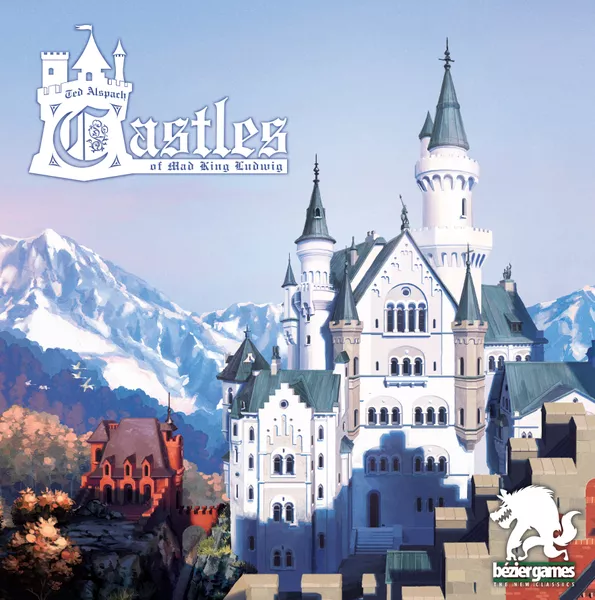
In my favorite tile-laying game, Castles of Mad King Ludwig, players build rooms in their castle to score points based on adjacent rooms and the room itself. Every round starts with the active player setting the price of the available room tiles. Then starting with the player to their left, players will take turns selecting a room to add to their castle and pay the cost of the room to the Master Builder (the active player from above). I love the pricing aspect at the beginning of every round because the player has to try to determine how much other players will value each room. Set the price too high and players will purchase the cheaper rooms, but set it too low and the player may miss out on getting extra money. Between Suburbia and Castles of Mad King Ludwig, Castles is easily my favorite, and it’s always fun to look at the crazy castles everyone has built at the end of the game.
1. Lost Ruins of Arnak
- Designers: Elwen, Mín
- Complexity: Medium
- Time: 30-120 Minutes
- Players: 1-4
- Main Mechanisms: Deck Building, Worker Placement
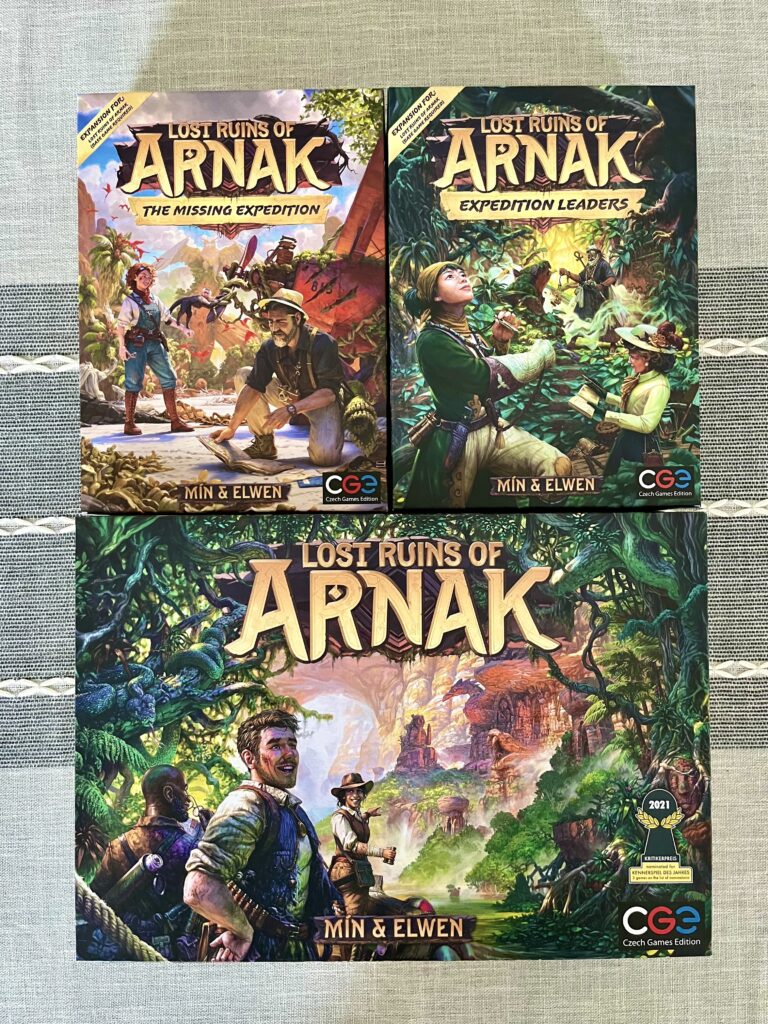
Lost Ruins of Arnak is not only my favorite game in the light to medium weight category, but it is also one of my favorite games of all time. In this Indiana Jones-esque game, players explore an uninhabited island. The game combines two of my favorite mechanisms, deck building and worker placement, to create an experience that feels tight, but also extremely satisfying and rewarding; each player only has two workers, and there are only five rounds. This creates a puzzle of how to eke out as many resources and actions in a round. The artwork and components are also beautiful to look at on the table. The game has two expansions, and I can’t recommend the first one, Expedition Leaders, enough as it adds asymmetric leaders at the start of each game. The second expansion, an up to two player cooperative campaign, is also a must if you’re a solo gamer. While Arnak is regularly compared to Dune: Imperium, and I still enjoy Dune quite a bit, Arnak is easily my favorite of the two. I’d highly recommend Lost Ruins of Arnak if you’re a fan of the combination of worker placement and deck building, or if you’re just looking for an excellent game.
With that, I’ll wrap up this week’s post! I’d love to hear your thoughts on any of the games I’ve mentioned, future content, or format in the comments section below, and let me know what your favorite Gateway+ games are. Happy gaming!
